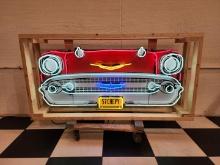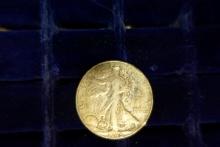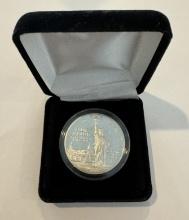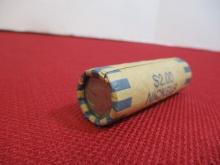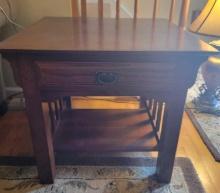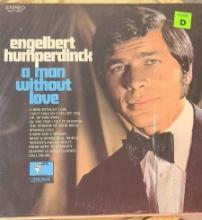5d 21h Left
Basketball Cards{"message":"In _app.tsx child of Layout","renderCount":1}
“Liberty without End. Amen.”
Lot Closed
Auction by Keno Auctions
This item is in New York, NY
Similar Items
5d 21h Left
Basketball Cards4d 3h Left
Twelve Tribes by Amen, Irving3d 3h Left
Sabbath Blessing by Amen, Irving5d 3h Left
Don Quixote by Amen, Irving1d 20h Left
LIBERTY WALKING 1/2 DOLLAR 1945$21.005d 22h Left
1986 S Liberty 90% Silver Commemorative Gem Proof Dollar$1.005d 22h Left
AMERICAN LIBERTY SERIES 2019 P 2.5oz SILVER MEDAL .999 SILVER$45.001d 19h Left
KNOTTY PINE ROUND END TABLE$1.251d 19h Left
DEPRESSION ERA WALNUT COLOR END TABLE$1.006d 11h Left
Maple end table in basement$1.251d 18h Left
SMALL PRIMITIVE END TABLE WITH CARDINAL LAMP$1.006d 11h Left
mixed wood end table with fruitwood top$1.503d 21h Left
The Adventures Of Captain America Sentinel Of Liberty Comic Book, Book One Of Four, Marvel11d 22h Left
Unsorted Roll of Buffalo Nickels-B$5.0011d 22h Left
Unsorted Roll of Buffalo Nickels-A$7.004d 9h Left
NICE 4" Pestle, Sits on Flat End, Found in Pennsylvania$11.001d 19h Left
FOUR PC RATTAN SET SOFA ROKCER ARM CHAIR AND END TABLE$1.0012d 20h Left
1916 Studebaker Pickup Truck Die Cast Metal Collector Edition Bank, 100th Anniversary, in original9d 18h Left
End Table $10 STS4d 10h Left
2 3/4" by 1 7/8" Spineback Gorget - Banded Slate - Ramp collection. Ex. Dave Warner.$16.004d 9h Left
6" Mano, Flat on One Long End, Found in Hunterdon Co., New Jersey, Interesting Example$10.0021h 53m Left
Seiko Melodies in Motion Beatles Clock$30.0012h 49m Left
Antique End Table9d 20h Left
Engelbert Humperdinck Record $1 STS2d 10h Left
HUGE Lifesize Western Diamond Rattlesnake (Cool Pose) TAXIDERMY$220.00Overview of “Liberty without End. Amen.”
Item Details
[SONS OF LIBERTY.] William Russell. Autograph document, Boston, Massachusetts, August 14, 1769, 1 p., with additional writing on verso.
These patriotic toasts—written on the fourth anniversary of Boston’s Stamp Act Riot—defiantly salute American liberty. The writer may have numbered among the 350 Sons of Liberty who celebrated the event at a dinner in Dorchester, Massachusetts. He would have been in good company: John Hancock, Paul Revere, Samuel Adams, and John Adams were among the guests.
“ Two of the toasts?—“May the Sons of Liberty Shine With Lustre” and “Liberty without End. Amen.”?—?need no explanation. However, two others beg explanation: “Wilks 45” refers to British parliamentarian John Wilkes, who was jailed in 1763 for publishing an incendiary criticism of the King in volume 45 of his journal, The North Briton. “45” became a colonial rallying cry, as seen twice on the hat of one figure in the framed image. “Wilkes 45” gained a counterpart in the “American 92,” referring to the 92 Massachusetts legislators who rejected the Royal governor’s demand they repeal a letter opposing the Stamp Act’s despised successor, the Townshend Acts.
Estimate $20,000 – 30,000
The much hated Stamp Act of 1765, Britain’s first attempt to impose a direct tax on the colonies, spawned the seeds of revolution in America. Cries of “Taxation Without Representation” echoed through the streets, stamp distributors were burned in effigy, and British goods were boycotted. That spirit of rebellion gave rise to the Sons of Liberty, a secretive group of patriots dedicated to opposing British tyranny.
On August 14, 1765, an effigy of stamp distributor Andrew Oliver was found hanging from a tree in the middle of Boston. It was one of the first acts of the Sons of Liberty. A large crowd gathered at the scene, parading through town with the effigy and burning it, before proceeding to attack Oliver’s home. British authorities had been put on notice: the citizens of Boston would stand up for their rights. Thanks in part to the riot, Parliament repealed the Stamp Act the next year.
August 14 became the unofficial birthday of the Sons of Liberty. In 1769, 350 members of the group attended a great dinner under a tent at the Liberty Tree Tavern in Dorchester. The revelers flew flags, played music, fired cannons, and offered up 45 toasts to everything from “All true Patriots throughout the World” to “The Speedy Removal of all Task Masters.” Among the attendees were John Hancock, Paul Revere, Samuel Adams, and John Adams. The latter recorded the event in his diary:
Dined with 350 Sons of Liberty at Robinsons, the Sign of Liberty Tree in Dorchester. We had two Tables laid in the open Field by the Barn … After Dinner was over and the Toasts drank we were diverted with Mr. Balch’s Mimickry … We had also the Liberty Song … and the whole Company joined in the Chorus. This is cultivating the Sensations of Freedom. There was a large Collection of good Company. Otis and Adams are politick, in promoting these Festivals, for they tinge the Minds of the People, they impregnate them with the sentiments of Liberty. They render the People fond of their Leaders in the Cause, and averse and bitter against all opposers. (Adams, August 14, 1769 Diary entry)
This document was found in the papers of William Russell (1748-1784), a schoolteacher, early member of the Sons of Liberty and Boston Tea Party participant. The writing on the verso, comprising the word “Answer” followed by several monetary figures, suggests that the toasts were drafted on a page from an old exercise book. Russell may have written all or part of the document.
In June 1777, Russell joined the Massachusetts artillery, with the rank of sergeant major and afterward adjutant. Following service in the Rhode Island campaign, Russell signed up as clerk on the Jason, commanded by Captain John Manley of Marblehead. The ship was captured on her first cruise, in September 1779, by the British frigate Surprise, and captain and crew were confined to Mill Prison in Plymouth, England. Russell whiled away his time there by conducting classes for the younger members of the captured American crews. His journal from that period is in the collection of the Peabody Essex Museum.
Russell was exchanged almost three years later, and returned to Boston in June aboard the cartel ship Lady’s [sometimes spelled Ladies’] Adventure. Three weeks after that, he re-entered the naval service, only to be recaptured by the British in November. This time Russell was incarcerated in the prison ship Jersey. He was released, for a second time, in March of 1783. After one more brief stint at sea, Russell returned to teach school in Cambridge, Massachusetts. His health shattered after his long imprisonment, Russell died of consumption in March of 1784.
Payment
Please contact the auction company for payment instructions.
CheckMoney Order
Auction Details
Auction House

Keno AuctionsNew York, NY









